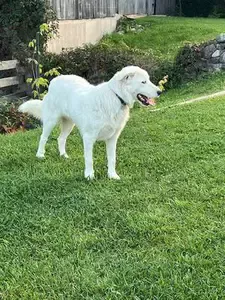Agression or normal Pyr behavior
by Sherry Ochoa
(Chicago, IL )
Hi, We rescued our Pyr when she was approx 4-5 months old from a high kill shelter. She was afraid of most new people including us when we met her. This progressed to her becoming very protective of our home as she grew bigger.
She is now a little over 2. We have been working with her and she has made great progress. We are able to get her to calm down fairly quickly if she becomes upset at someone or something she sees outside.
My problem is that I am wondering if her behavior is pretty normal for her breed? This is our first Pyr. We had a lab before so a very different aesthetic.
I feel like a lot of the time she is doing her job watching our house when she is barking growling.... We did/do still have an issue with her letting anyone in our house as well, which we continue to work on. As long as they come in and do not make eye contact or try to approach her she will eventually go to them. She is still very cautious of them and checks on them often and if they get up or make fast movement she will growl or bark.
I should also say that at the recommendation of our vet we saw a veterinary specialist who prescribed anti-anxiety medication for her which allowed us to work with her and provide positive reinforcement and rewards for good behavior. We are in the process of weaning her off of it to see if she continues with success.
I'm just wondering how much of this is the Pyr aesthetic. We really do not want to keep her on medication unless it is absolutely necessary. Thank you for your help!
Comments for Agression or normal Pyr behavior
|
||
|
||
|
||
|
||
|
||
|
||
|
||
|
||
|
||
|
||
|
||
|
||
|
||
|
||
|
||
Breaking News
-
Courtesy Post - Sarge
Dec 20, 25 05:32 PM
Courtesy Post - Sarge Location: Mount Albert, Ontario DoB: Unknown 2023 Required: He is comfortable around livestock, but he will go as a companion -
Bo
Dec 12, 25 02:22 PM
*ON HOLD* DOB: late Sept 2023 (don’t know for sure) rescued Dec 2023 Location: Acton, Ontario Name: Bo Single dwelling home with a securely fenced -
Hardy
Nov 25, 25 02:42 PM
Hardy Location: Acton, ON DOB: Approx. January 2025 (we think he is older though) Single-family home required. Minimum 5-foot securely fenced yard. -
Ronnie
Nov 22, 25 06:20 AM
*Adopted* Location: Acton, ON DOB: 9-years-old This big sweetheart went to foster and was soon adopted before we got him posted. From the shelter: -
Lola
Nov 19, 25 12:01 PM
*ADOPTED* A single family dwelling and a securely fenced yard of at least 5 feet are musts. DOB approx: Februay 12, 2021 Location: Acton, Ontario This -
Mayne
Nov 07, 25 04:04 PM
*ADOPTED* (FOSTER FAIL) Mayne Location: Acton, ON DOB: August 5, 2017 (8-years-old) Single-family home required. Minimum 5-foot securely fenced yard. -
Courtesy Post - Remi
Oct 17, 25 11:09 AM
*ADOPTED* Remi (Retriever/Pyr cross) D.o.B: Sept. 30, 2023 Location: Between Owen Sound and Port Elgin (Tara, ON) Remi was given up because of health -
Courtesy Post - Virgil
Sep 30, 25 01:03 PM
*ADOPTED* DoB of Virgil: 2021 (4.5 years old) Reason for rehoming this big white fluffy: Owner has passed away and he is presently living in an apartment.













